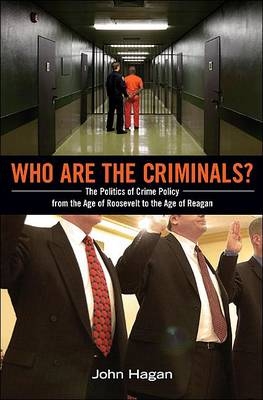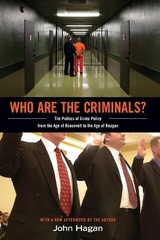
Who Are the Criminals?
The Politics of Crime Policy from the Age of Roosevelt to the Age of Reagan
Seiten
2010
Princeton University Press (Verlag)
978-0-691-14838-0 (ISBN)
Princeton University Press (Verlag)
978-0-691-14838-0 (ISBN)
- Titel erscheint in neuer Auflage
- Artikel merken
Zu diesem Artikel existiert eine Nachauflage
How did the United States go from being a country that tries to rehabilitate street criminals and prevent white-collar crime to one that harshly punishes common lawbreakers while at the same time encouraging corporate crime through a massive deregulation of business? This title provides answers to these vitally important questions.
How did the United States go from being a country that tries to rehabilitate street criminals and prevent white-collar crime to one that harshly punishes common lawbreakers while at the same time encouraging corporate crime through a massive deregulation of business?Why do street criminals get stiff prison sentences, a practice that has led to the disaster of mass incarceration, while white-collar criminals, who arguably harm more people, get slaps on the wrist - if they are prosecuted at all? In "Who Are the Criminals?, one of America's leading criminologists provides new answers to these vitally important questions by telling how the politicization of crime in the twentieth century transformed and distorted crime policymaking and led Americans to fear street crime too much and corporate crime too little. John Hagan argues that the recent history of American criminal justice can be divided into two eras - the age of Roosevelt (roughly 1933 to 1973) and the age of Reagan (1974 to 2008). A focus on rehabilitation, corporate regulation, and the social roots of crime in the earlier period was dramatically reversed in the later era.
In the age of Reagan, the focus shifted to the harsh treatment of street crimes, especially drug offenses, which disproportionately affected minorities and the poor and resulted in wholesale imprisonment. At the same time, a massive deregulation of business provided new opportunities, incentives, and even rationalizations for white-collar crime - and helped cause the 2008 financial crisis and subsequent recession. The time for moving beyond Reagan-era crime policies is long overdue, Hagan argues. The understanding of crime must be reshaped and we must reconsider the relative harms and punishments of street and corporate crimes.
How did the United States go from being a country that tries to rehabilitate street criminals and prevent white-collar crime to one that harshly punishes common lawbreakers while at the same time encouraging corporate crime through a massive deregulation of business?Why do street criminals get stiff prison sentences, a practice that has led to the disaster of mass incarceration, while white-collar criminals, who arguably harm more people, get slaps on the wrist - if they are prosecuted at all? In "Who Are the Criminals?, one of America's leading criminologists provides new answers to these vitally important questions by telling how the politicization of crime in the twentieth century transformed and distorted crime policymaking and led Americans to fear street crime too much and corporate crime too little. John Hagan argues that the recent history of American criminal justice can be divided into two eras - the age of Roosevelt (roughly 1933 to 1973) and the age of Reagan (1974 to 2008). A focus on rehabilitation, corporate regulation, and the social roots of crime in the earlier period was dramatically reversed in the later era.
In the age of Reagan, the focus shifted to the harsh treatment of street crimes, especially drug offenses, which disproportionately affected minorities and the poor and resulted in wholesale imprisonment. At the same time, a massive deregulation of business provided new opportunities, incentives, and even rationalizations for white-collar crime - and helped cause the 2008 financial crisis and subsequent recession. The time for moving beyond Reagan-era crime policies is long overdue, Hagan argues. The understanding of crime must be reshaped and we must reconsider the relative harms and punishments of street and corporate crimes.
John Hagan is the John D. MacArthur Professor of Sociology and Law at Northwestern University and the American Bar Foundation. He received the Stockholm Prize in Criminology in 2009. His books include "Darfur and the Crime of Genocide".
List of Illustrations ix Prologue: Washington Crime Stories 1 Chapter 1: The President's Secret Crime Report 10 Chapter 2: Street Crimes and Suite Misdemeanors 31 Chapter 3: Explaining Crime in the Age of Roosevelt 69 Chapter 4: Explaining Crime in the Age of Reagan 101 Chapter 5: Framing the Fears of the Streets 137 Chapter 6: Framing the Freeing of the Suites 168 Chapter 7: Crime Wars, War Crimes, and State Crimes 213 Epilogue: The Age of Obama? 257 Acknowledgments 269 References 271 Index 293
| Zusatzinfo | 15 line illus. 4 tables. 1 map. |
|---|---|
| Verlagsort | New Jersey |
| Sprache | englisch |
| Maße | 152 x 235 mm |
| Gewicht | 595 g |
| Themenwelt | Geschichte ► Teilgebiete der Geschichte ► Militärgeschichte |
| Recht / Steuern ► Allgemeines / Lexika | |
| Recht / Steuern ► EU / Internationales Recht | |
| Recht / Steuern ► Rechtsgeschichte | |
| Recht / Steuern ► Strafrecht ► Kriminologie | |
| Sozialwissenschaften ► Politik / Verwaltung ► Staat / Verwaltung | |
| ISBN-10 | 0-691-14838-4 / 0691148384 |
| ISBN-13 | 978-0-691-14838-0 / 9780691148380 |
| Zustand | Neuware |
| Haben Sie eine Frage zum Produkt? |
Mehr entdecken
aus dem Bereich
aus dem Bereich
neueste Manipulationstechniken als Waffengattung der NATO
Buch | Softcover (2023)
Westend (Verlag)
24,00 €
Deutschlands Schwäche in der Zeitenwende
Buch | Softcover (2023)
C.H.Beck (Verlag)
18,00 €



